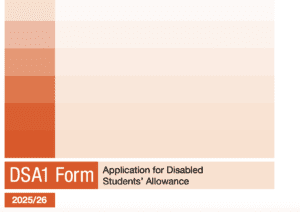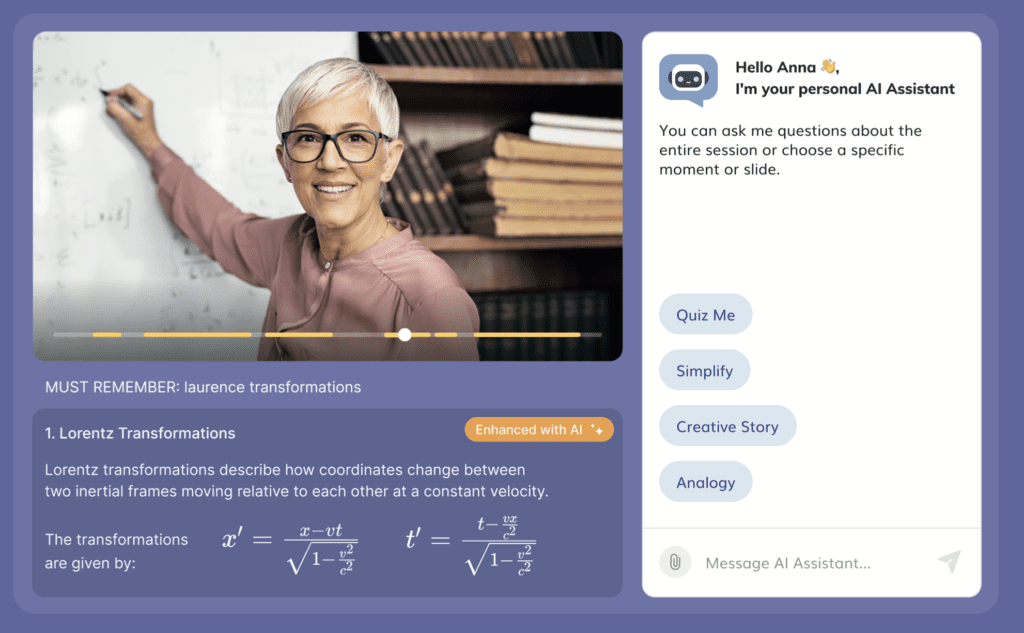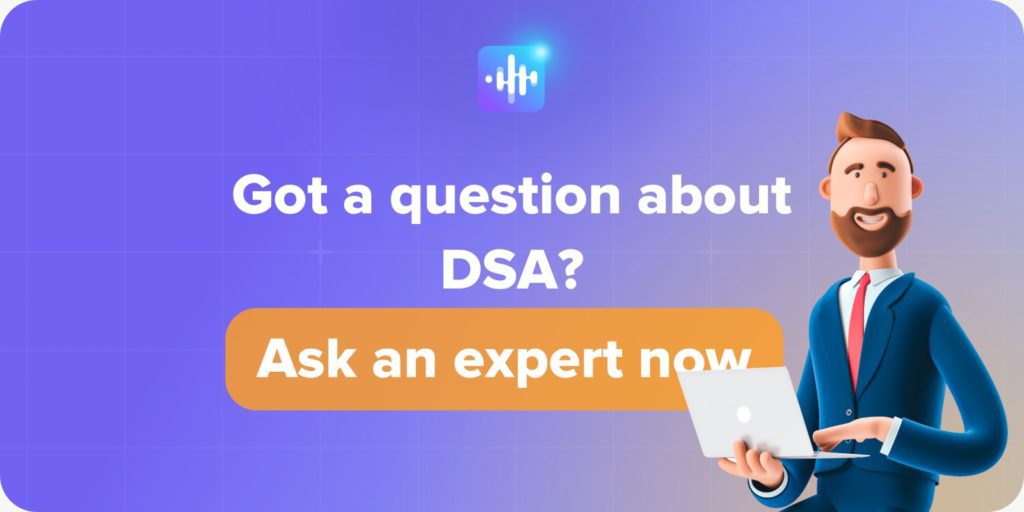Disabled Students’ Allowance (DSA) is a government grant designed to help cover the study-related costs that students face due to a disability, long-term health condition, mental health condition, or specific learning difficulty. Unlike a student loan, DSA does not have to be paid back.
This comprehensive guide will walk you through the entire DSA process, from checking your eligibility to receiving your support.
In This Guide:
- Who is Eligible for DSA?
- The DSA Application Process: A Step-by-Step Guide
- Providing the Correct Evidence for Your Application
- A Closer Look at the DSA1 Form
- What Support Can I Get Through DSA?
- What If I’m Not Eligible for DSA?
- Frequently Asked Questions (FAQ)
Who is Eligible for DSA?
To be eligible for DSA, you must have a diagnosed condition that affects your ability to study. You must also meet certain residency and course requirements.
Condition & Disability Requirements
Your condition must fall into one of the following broad categories:
- Specific Learning Difficulty (SpLD): A condition that directly impacts brain function and learning, such as affecting memory, organisation, or reading and writing abilities. Examples include:
- Dyslexia
- ADHD
- Dyspraxia
- Dyscalculia
- Mental Health Condition: A diagnosed condition that has a long-term effect on your day-to-day life and studies. Examples include:
- Generalised Anxiety Disorder
- Depression
- Post-Traumatic Stress Disorder (PTSD)
- Bipolar Disorder
- Obsessive Compulsive Disorder (OCD)
- Autism Spectrum Disorder (ASD)
- Eating Disorders
- Physical Disability: A condition that affects your mobility or ability to carry out physical day-to-day activities. Examples Include:
- Limited mobility
- Arthritis
- Cerebral Palsy
- Spinal Cord Injuries
- Multiple Sclerosis
- Any condition requiring the use of a wheelchair or crutches.
- Sensory Disability: A condition that affects one or more of your senses. Examples include:
-
- Blind or Low Vision
- Deaf or Hard of Hearing
-
- Long-term Health Condition: A chronic illness or health condition that has a substantial impact on your ability to study. Examples include:
-
- Cancer
- Chronic Fatigue Syndrome (ME/CFS)
- HIV
- Epilepsy
- Crohn’s Disease
- Chronic Migraines
- Diabetes
-
The key question to ask is: “Does my condition have a direct and long-term impact on my ability to study and learn at university?” If the answer is yes, you are likely eligible.
Residency and Course Requirements
In addition to having an eligible condition, you must also:
- Be a UK resident (having lived in the UK for at least three years before your course starts).
- Be studying on a full-time or part-time undergraduate or postgraduate course (including PhDs) that lasts for at least one year.
Unfortunately, DSA is generally not available for international or EU students, or for students on apprenticeships. However, if you are ineligible, your university may have other support available (see What If I’m Not Eligible for DSA? below).
The DSA Application Process: A Step-by-Step Guide

You can apply for DSA as soon as the application window opens for your academic year—you don’t need to wait for a confirmed university place. The entire process can take several weeks, so it’s best to start as early as possible.
Step 1: Complete the Application Form
There are two main ways to apply:
- Through your Student Finance Account (Easiest Method): If you are also applying for a tuition or maintenance loan, log in to your Student Finance account. You can either select the option for DSA during your main application or click “Change your circumstances” on an existing application to add DSA.
- Using the DSA1 Form: If you are not applying for any other student finance, you will need to apply for DSA on its own by completing a DSA1 form. You can find the most up-to-date version by searching for “DSA1 form” on the GOV.UK website.
Step 2: Submit Your Medical Evidence
After applying, you will need to provide proof of your condition. This is a critical step and is covered in more detail in the next section.
Step 3: Await Approval and Book Your Needs Assessment
Once your application and evidence have been reviewed and approved, you will receive an email from Student Finance inviting you to book a DSA Needs Assessment.
Step 4: Attend Your Needs Assessment
This is not a test. It is a relaxed, informal conversation with an experienced assessor to discuss how your condition affects your studies and what support would help you succeed. The assessment is usually held online or at a local assessment centre.
- Tip: Before your assessment, make notes on all the ways your condition impacts your studies—from attending lectures and taking notes to writing essays and revising for exams. This will help you remember everything during the meeting.

Step 5: Receive Your DSA Entitlement Letter
After the assessment, the assessor will write a report recommending specific equipment, software, and support for you. Once this is approved by Student Finance, you will receive an official “DSA Entitlement Letter” confirming exactly what has been funded and listing the suppliers who will provide it.
Step 6: Get Your Support
Once your support is approved, the suppliers will get in touch to arrange everything. Your equipment will be delivered, and an Assistive Technology (AT) Trainer will book a session to show you how to use your new software and tools.
Providing the Correct Evidence for Your Application
Providing clear and correct evidence is the most important part of your application. The evidence must explain how your condition has a long-term impact on your ability to study.
For a Confirmed Diagnosis:
You can provide a copy of:
- A diagnostic assessment report from a qualified professional (such as an educational psychologist for SpLDs).
- A letter from your GP or a medical specialist confirming your diagnosis and outlining how it affects you.
If You’re on a Waiting List for an Assessment:
If you do not have a formal diagnosis but are on an official waiting list, you can provide:
- A letter from your GP or specialist confirming you are on a waiting list for assessment. This letter should also detail the symptoms you are experiencing and why they believe an assessment is necessary.
In some cases, you may be asked for your medical professional to complete a Disability Evidence Form, which can be downloaded from the GOV.UK website.
A Closer Look at the DSA1 Form
If you are not applying for other student finance, you will need to complete the full DSA1 paper application form. Here is a brief breakdown of its sections:

- Section 1: Personal Details: Your personal information, contact details, and identity document details (e.g., passport number).
- Section 2: Other Financial Support: Details of any other funding you might be receiving, such as an NHS bursary.
- Section 3: Residence: Information about your nationality and address history for the past three years.
- Section 4: Course and University Details: Information about the course you will be studying.
- Section 5: University/College Section: This part is for your university to complete.
- Section 6: Your Disability: This is where you describe your condition and how it impacts your ability to study. You must also provide consent for your information to be shared with assessors and suppliers.
- Section 7: Bank Details: Your UK bank account details.
Before sending the form, use the checklist at the end to ensure you have included all necessary documents and completed all relevant sections.
What Support Can I Get Through DSA?
DSA is tailored to your individual needs. The support is intended to level the playing field and help you study as effectively as your peers. It is not for costs that every student has, like textbooks or standard laptops.
For the 2025 to 2026 academic year, support is provided as a single allowance up to the following maximum amounts:
- England: £27,783
- Wales: £34,000
- Northern Ireland: £25,000
- Scotland: £27,405 – comprising of £1,725 for Consumable Items, £5,160 for Equipment & Software and £20,520 for Non-Medical Personal Help.

Common forms of support include:
- Specialist Equipment: Such as an ergonomic chair, a laptop, a specific keyboard, or a digital voice recorder.
- Assistive Technology: Specialist software to help with your studies. This can include note-taking apps like Jamworks, speech-to-text software, or mind-mapping tools.
- Non-Medical Helpers (NMH): One-to-one support from specialists, such as a study skills tutor, a specialist mentor for mental health, or a British Sign Language (BSL) interpreter.
- Other Allowances: This can include a contribution towards extra travel costs incurred because of your disability, or printing and photocopying credits.
You can vie more info about the DSA Equipment List here.

What If I’m Not Eligible for DSA?
If you find out you are not eligible for DSA (for instance, due to your residency status), do not panic. There are other avenues for support:
- University Disability Support Team: Your university’s disability team is your first port of call. They can create an individual learning plan for you, which can include provisions like extensions on assignments, extra time in exams, or leeway on attendance. They may also have their own equipment and software you can access.
- University Hardship Fund: Most universities have a student support or hardship fund for students struggling with costs. They may be able to provide funding for assistive technology or other support, especially for international students who are ineligible for DSA.
Frequently Asked Questions (FAQ)

How long does the DSA application process take?
The timeframe can vary, but it’s wise to budget up to 14 weeks from submitting your application to receiving your support. It can take up to six weeks for your application to be approved, and another six weeks after your needs assessment to get your entitlement letter and arrange support. Start as early as you can.
What should I do if my DSA application is denied?
First, find out the reason. If it was due to insufficient evidence, you can re-apply once you have obtained the correct documentation. If you believe the decision was incorrect, you can contact the DSA team to appeal. Your university’s disability team can also provide advice and support in this situation.
Can I apply for DSA as a postgraduate student?
Yes. DSA is available for eligible postgraduate students (including those on Masters and PhD courses) on the same basis as undergraduate students.
Do I have to pay DSA back?
No. DSA is a grant, not a loan, and does not need to be repaid.
Can I ask for Jamworks during my DSA Needs Assessment?
Yes. If you believe that Jamworks‘ enhanced note taking support and personal tutor experiences could help you with your note taking and learning it is a good idea to request Jamworks during your DSA Assessment.
Join the Jamworks DSA Community on Discord to ask an expert or community of students about anything related to the DSA.
